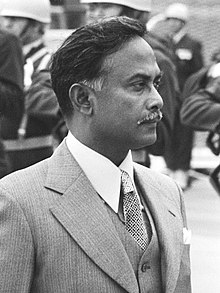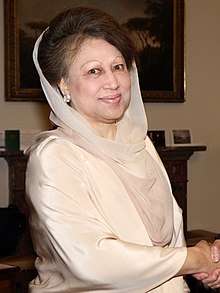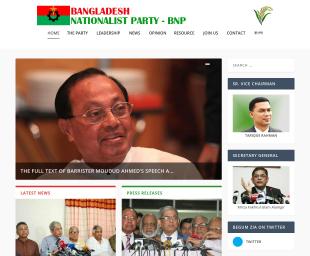The Bangladesh Nationalist Party (BNP) is a political party in Bangladesh with a significant history. It was founded in 1978 by Ziaur Rahman and has played a significant role in the country’s politics.
The BNP has been involved in various political movements and has seen both successes and challenges throughout its existence. As one of the major political parties in Bangladesh, the BNP has had a significant impact on the country’s political landscape.
Its history is intertwined with the struggle for democracy and the quest for power in Bangladesh.
The Genesis Of Bangladesh Nationalist Party (bnp)
The Bangladesh Nationalist Party (BNP) has played a significant role in shaping the political landscape of Bangladesh since its inception. Understanding the genesis of BNP allows for a comprehensive insight into the party’s founding principles, early leaders, and its impact on the country’s political history.
The Political Landscape Pre-bnp
Prior to the emergence of the Bangladesh Nationalist Party (BNP), the political landscape of Bangladesh was dominated by the Bangladesh Awami League, which had successfully led the country to independence. The period preceding the formation of BNP was characterized by a power struggle and ideological differences among various political factions.
Founding Principles And Early Leaders
Founded in 1978, BNP was established on the principles of nationalism, democracy, and economic self-reliance. It aimed to provide a strong opposition to the ruling party and advocate for the rights of the people. The party’s early leaders, including its founder Ziaur Rahman, played a pivotal role in shaping its ideology and organizational structure.

Credit: www.loc.gov
Milestones And Struggles
The Bangladesh Nationalist Party has experienced significant milestones and struggles throughout its history. Founded in 1978, the party has played a crucial role in the country’s politics, facing challenges such as periods of government repression and internal divisions. Despite these obstacles, the party has remained a prominent force in Bangladesh’s political landscape.
First Steps In Governance
The Bangladesh Nationalist Party (BNP) was founded on September 1, 1978, by former President Ziaur Rahman with the aim of upholding the rights of the people of Bangladesh. After the assassination of Ziaur Rahman in 1981, his widow, Khaleda Zia, took over the leadership of BNP and played a pivotal role in shaping the party’s governance. In 1991, BNP achieved a significant milestone by winning the general elections and forming the government, marking its first steps in governance. During its tenure, BNP implemented various policies and initiatives to address the country’s economic and social challenges.
Confrontations And Political Crises
BNP faced numerous confrontations and political crises throughout its history. In 1982, the party experienced internal turmoil following the assassination of Ziaur Rahman, which posed a significant challenge to its stability. Additionally, during the 2006 political crisis, BNP encountered widespread protests and opposition, leading to a state of political unrest. These confrontations tested the resilience of the party and its ability to navigate through turbulent times while upholding its core principles and values.
Leadership Dynamics
The leadership dynamics within the history of the Bangladesh Nationalist Party have played a crucial role in shaping the country’s political landscape. As the main opposition to the ruling Awami League, the BNP has a significant impact on Bangladesh’s governance and policies.
Over the years, the party’s leadership has navigated through various challenges and changes, influencing the nation’s socio-political development.
Ziaur Rahman’s Era
Ziaur Rahman was the founder of the Bangladesh Nationalist Party (BNP) and served as the President of Bangladesh from 1977 until his assassination in 1981. During his time as the leader of the party, Ziaur Rahman introduced a new concept of leadership dynamics, which was based on the principles of nationalism, democracy, and socialism. He believed in the empowerment of the people, which led to the formation of the Jatiyatabadi Krishak Dal and Jatiyatabadi Sramik Dal, the farmer and worker wings of the party.Khaleda Zia’s Influence
After the assassination of Ziaur Rahman, his wife, Khaleda Zia, assumed the leadership of the Bangladesh Nationalist Party. Khaleda Zia played a significant role in shaping the leadership dynamics of the party. During her tenure as the leader of the party, she focused on strengthening the party’s organizational structure and consolidating its support base. Khaleda Zia also emphasized the role of women in politics and introduced a quota system for women in the party’s decision-making bodies. Under Khaleda Zia’s leadership, the Bangladesh Nationalist Party won the 1991 general elections and formed the government. She was re-elected as the Prime Minister in 2001. However, her tenure was marked by political instability and allegations of corruption, which led to her removal from power in 2006. In conclusion, the leadership dynamics of the Bangladesh Nationalist Party have evolved over time, under the influence of different leaders. Ziaur Rahman introduced the concept of empowerment of the people, while Khaleda Zia focused on strengthening the party’s organizational structure and consolidating its support base.
Credit: en.wikipedia.org
Bnp’s Electoral Journey
The Bangladesh Nationalist Party (BNP) has a rich electoral history, playing a significant role in the country’s politics. From its formation in the late 1970s to its participation in various parliamentary elections, the party has been an influential force in shaping Bangladesh’s political landscape.
With its distinct ideology and strong leadership, BNP continues to be a prominent player in the country’s electoral journey.
Victories And Defeats
The Bangladesh Nationalist Party (BNP) has had a long electoral journey marked by both victories and defeats. Since its inception in 1978, the party has participated in numerous parliamentary elections, experiencing varying degrees of success. In the early years, the BNP emerged as a formidable force in Bangladeshi politics. They secured a significant victory in the 1979 elections, winning 207 out of 300 seats and forming the government. This marked the first major electoral success for the party and established their presence on the political landscape. However, the BNP faced setbacks in subsequent elections. They suffered defeat in the 1986 and 1988 elections, failing to gain a majority. Despite these defeats, the party remained resilient and continued to play a significant role in parliamentary evolution.The Role In Parliamentary Evolution
Throughout its electoral journey, the BNP has played a crucial role in shaping the parliamentary system in Bangladesh. They have been actively involved in the legislative process, advocating for their party’s ideology and policies. The BNP has not only participated in elections but also contributed to the development of parliamentary democracy. They have been instrumental in debates, discussions, and policy-making, ensuring that the voices of their supporters are heard and represented. By participating in parliamentary sessions, the BNP has helped in the evolution of the democratic process in Bangladesh. Their active involvement has facilitated the growth of a multi-party system, providing citizens with diverse political choices. In conclusion, the BNP’s electoral journey has been marked by victories and defeats. While they have faced setbacks in certain elections, the party has played a significant role in shaping the parliamentary system in Bangladesh. Through their active participation in the legislative process, the BNP has contributed to the development of a vibrant democracy in the country.Policies And Ideologies
The Bangladesh Nationalist Party (BNP) has a rich history in the political landscape of Bangladesh. As one of the oldest political parties in the country, BNP has played a significant role in shaping the nation’s ideologies and policies. With its conservative stance, BNP has been a major opposition party, providing an alternative voice in the Jatiya Sangsad against the ruling Awami League.
The Bangladesh Nationalist Party (BNP) is one of the oldest and major political parties in Bangladesh. It was founded in 1978 by General Ziaur Rahman. The party has a rich history of policies and ideologies that have shaped the political landscape of Bangladesh. In this blog post, we will discuss the economic visions and foreign policy stances of the BNP.Economic Visions
The BNP has always emphasized economic development and prosperity for Bangladesh. The party’s economic vision is based on a free-market economy that promotes entrepreneurship, private investment, and job creation. The BNP believes in reducing government interference in the economy and promoting a business-friendly environment to attract foreign investment. The party has also promised to introduce tax incentives for businesses to stimulate growth and job creation.Foreign Policy Stances
The BNP has always been vocal about its foreign policy stances. The party believes in maintaining friendly relations with all countries, including India, China, and the United States. The BNP has promised to strengthen diplomatic ties with neighboring countries, particularly India, to promote regional stability and security. The party has also emphasized the importance of economic cooperation with other countries to boost trade and investment. In conclusion, the Bangladesh Nationalist Party has a clear vision for economic development and foreign policy. The party’s policies and ideologies have evolved over time, but its commitment to economic growth and regional stability remains unchanged. The BNP’s vision for a free-market economy and friendly foreign relations has the potential to bring significant benefits to Bangladesh and its people.Controversies And Criticisms
The history of Bangladesh Nationalist Party (BNP) is marked by controversies and criticisms. The party has faced allegations of corruption, authoritarianism, and violence. Despite its significant role in the country’s politics, BNP has often been at the center of heated debates and public scrutiny.
Controversies and Criticisms: The Bangladesh Nationalist Party (BNP) has faced many controversies and criticisms throughout its history. Some of the major controversies include allegations of corruption and human rights issues. H3: Allegations of corruption The BNP has been accused of corruption on multiple occasions. The most notable case was during the tenure of former Prime Minister Khaleda Zia, who was accused of embezzling millions of dollars from a charitable trust. The case led to her imprisonment and sparked widespread protests across the country. H3: Human rights issues The BNP has also been criticized for its record on human rights. During its tenure in power, the party was accused of using excessive force against protesters and suppressing dissent. In addition, the BNP has been accused of having links to extremist groups and failing to take action against them. In conclusion, the BNP has faced significant controversies and criticisms throughout its history. Allegations of corruption and human rights issues have been major sources of criticism for the party.Bnp In Opposition
The Bangladesh Nationalist Party (BNP) has a rich history as one of the major political parties in Bangladesh. It has played a significant role in the country’s politics and has been a strong opposition party against the ruling Awami League.
With its conservative ideology, the BNP continues to be an influential force in the Jatiya Sangsad.
Strategies And Challenges
In their role as the opposition party, the Bangladesh Nationalist Party (BNP) has employed various strategies to challenge the ruling party and influence public perception. One of their key strategies has been to mobilize their supporters through mass demonstrations, rallies, and strikes. These activities aim to create pressure on the government and highlight their grievances and demands. Additionally, the BNP has actively utilized social media platforms to reach a wider audience and garner support for their cause. However, the BNP has faced several challenges in their opposition role. One major challenge is the government’s crackdown on dissent and political opposition. The ruling party has often used its power to suppress BNP activities, including arresting party leaders, imposing restrictions on public gatherings, and controlling media coverage. This has made it difficult for the BNP to effectively mobilize their supporters and challenge the ruling party’s policies.Public Perception And Support
Public perception and support play a crucial role in the success of any opposition party. For the BNP, managing public perception has been a constant challenge. The ruling party has often portrayed the BNP as a party involved in corruption, violence, and destabilizing the country. This negative portrayal has had an impact on public perception, leading to a decline in support for the BNP. To counter this, the BNP has focused on highlighting issues that resonate with the public, such as economic inequality, unemployment, and social justice. They have also made efforts to present themselves as a viable alternative to the ruling party, emphasizing their experience and track record in governance. However, gaining widespread public support remains a challenge for the BNP due to the ruling party’s dominance in the political landscape and their control over key institutions. Overall, the BNP faces significant obstacles in their role as the opposition party in Bangladesh. While they employ various strategies to challenge the ruling party and mobilize their supporters, they also contend with the government’s crackdown on dissent and negative public perception. Navigating these challenges is crucial for the BNP to maintain their relevance and effectively advocate for their policies and agenda.Looking Forward
The Bangladesh Nationalist Party (BNP) is one of the oldest political parties in Bangladesh, founded in 1978 by General Ziaur Rahman. The party is known for its nationalist and conservative ideologies and has played a significant role in the country’s politics for the last four decades. The party has had a tumultuous history, with various ups and downs, including periods of military rule, political unrest, and violence.
Future Leadership Prospects
The BNP has gone through several leadership changes since its inception, with Khaleda Zia being the most prominent leader of the party. However, due to her conviction in corruption cases, she is currently serving a jail term, and the party is struggling to find a new leader who can unite the party and lead it to success. The party needs to identify a strong and charismatic leader who can connect with the people and inspire them to support the party’s vision.
Adapting to New Political Landscapes
The BNP needs to adapt to the changing political landscape of Bangladesh to remain relevant and competitive. The party has been out of power since 2006 and has struggled to gain significant support in recent elections. The BNP needs to revamp its strategies, policies, and image to attract the younger generation and urban voters. The party needs to focus on issues that matter to the people, such as employment, education, healthcare, and social justice, and come up with practical solutions to address these issues.
Ensuring Unity and Cohesion
The BNP has faced internal divisions and factionalism, which has weakened the party’s position and effectiveness. The party needs to ensure unity and cohesion among its members and leaders to present a united front to the people. The party needs to build a strong and inclusive organizational structure that accommodates diverse views and opinions and promotes intra-party democracy. The party needs to prioritize the interests of the party over individual interests and work towards the common goal of serving the people of Bangladesh.
In conclusion, the BNP has a rich history and has contributed significantly to Bangladesh’s political landscape. However, to remain relevant and competitive, the party needs to adapt to the changing times and focus on the future. The party needs to identify a strong and charismatic leader, adapt to the changing political landscape, and ensure unity and cohesion among its members and leaders to succeed in the future.

Credit: en.wikipedia.org
Frequently Asked Questions
What Is The History Of Bnp In Bangladesh?
The Bangladesh Nationalist Party (BNP) is one of the major political parties in Bangladesh. It was founded in 1978 by Ziaur Rahman, who served as the country’s president from 1977 until his assassination in 1981. The BNP has had a significant influence on the political landscape of Bangladesh, and has been both in power and in opposition at different times throughout its history.
What Is The Oldest Political Party In Bangladesh?
The oldest political party in Bangladesh is the Bangladesh Awami League, which successfully led the country to independence.
What Is The National Party Of Bangladesh?
The national party of Bangladesh is the Jatiya Party, which is currently the main opposition in the Jatiya Sangsad.
What Is The History Of The Bnp?
The Bangladesh Nationalist Party (BNP) is one of the major political parties in Bangladesh, founded in 1978. It has played a significant role in the country’s politics, with its leaders serving as Prime Ministers.
Conclusion
The history of the Bangladesh Nationalist Party (BNP) is a fascinating tale of political movements and transformations. From its establishment to its current status as a major political party in Bangladesh, the BNP has played a significant role in shaping the country’s political landscape.
With a strong emphasis on nationalism and conservative values, the BNP has consistently positioned itself as the main opposition to the ruling Awami League. Through its leaders and members, the party has faced various challenges and triumphs, contributing to the democratic process in Bangladesh.
As we delve into the history of the BNP, we gain a deeper understanding of the party’s impact on the nation.

